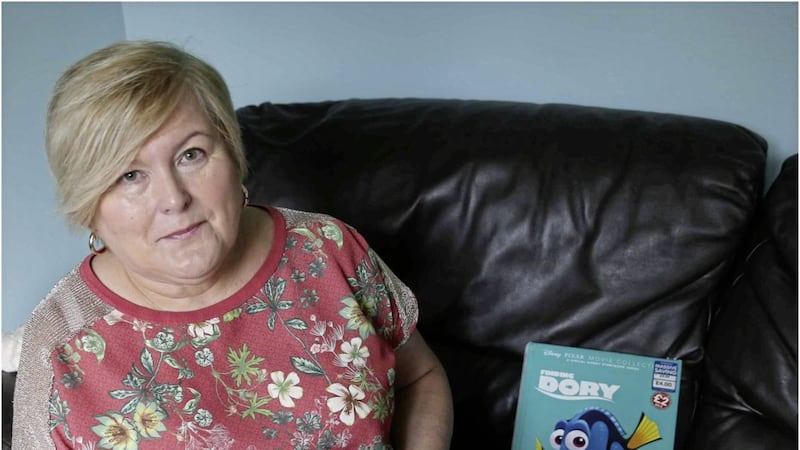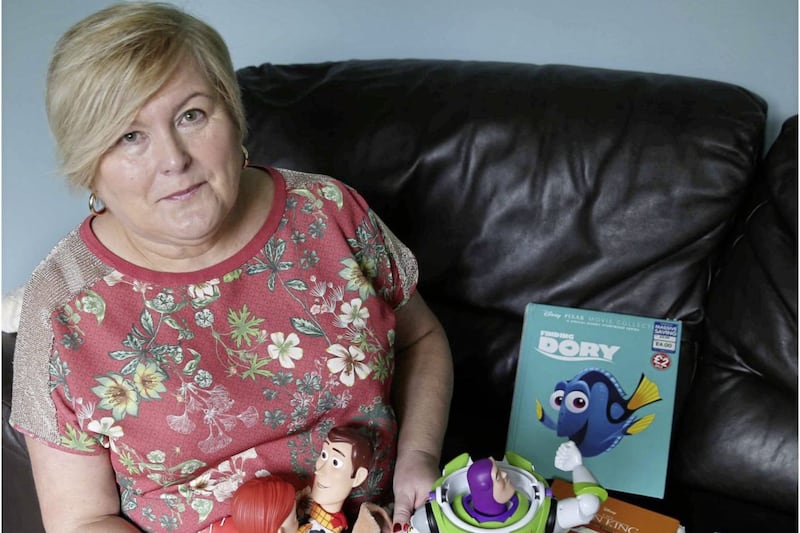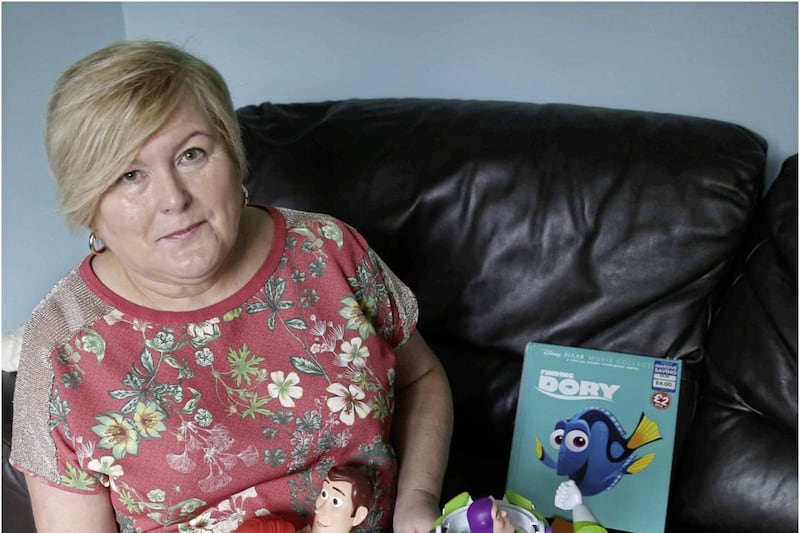WHEN Karen Brown "handed over" her son to staff at Muckamore Abbey Hospital in the spring of 2017, she was told "he will be safe here".
It was the first time Aaron Brown, then 20, had ever been out of her care and for the Dundonald woman it was akin to "giving your baby away".
Her severely autistic "sweet, gentle boy", whose favourite past-time was looking at Lion King books and playing with Toy Story's 'Woody', had become mentally unwell the previous year, with his behaviour turning increasingly aggressive and violent.
Non-verbal, epileptic and suffering from severe learning disabilities, his condition worsened and in one horrific incident he bit off the top of his mother's thumb - leading to an admission to Muckamore's six-bedded Psychiatric Intensive Care Unit (PICU).
It was in that secure unit in Co Antrim that an alleged attack on Aaron was captured on CCTV in August 2017 - an incident that would trigger the biggest adult safeguarding investigation of its kind for the PSNI.
To date, 1,500 alleged crimes against patients have identified in the PICU ward alone while 28 Muckamore staff - mainly nurses - have been suspended. It is understood more suspensions are imminent.
While Mrs Brown's husband, Glynn, spoke publicly for the first time in The Irish News in March about his battle to get information from the Belfast health trust - he also played a crucial role in alerting the the Department of Health to the scale of the crisis - Karen has now decided to go on record to outline the personal impact.
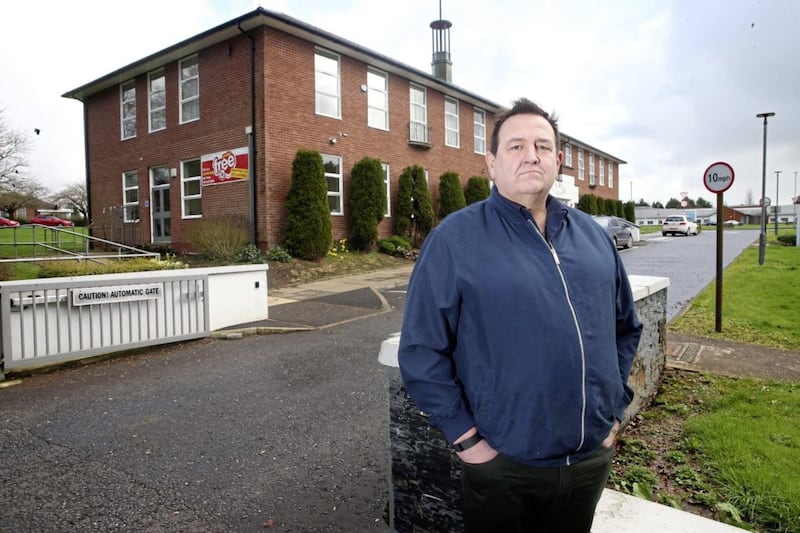
Struggling to compose herself during our interview, the 56-year-old former teaching assistant admits she is "full of jitters" having just received an update from detectives about the number of "incidents" identified on CCTV in relation to their case.
"We've lost count, it's at 120 to 130 - and they go into the nature of it. It's like putting a knife into me each time," Mrs Brown said.
Read More: Families of Muckamore patients invited for meetings with Belfast health trust
"I relive it. I’m reliving allegations of my son been kicked in the groin, punched in the stomach, punched in the head, mistreated by lack of supervision.
"I still can't believe the magnitude of it, I still can't get my head around it. Effectively they have hurt a toddler - my son is like a toddler in a man's body, he's such a vulnerable person.
"Had my son been aggressive, I could have tried to understand but police told us that every time he suffered ill treatment he's just been passive and doing nothing.
"I've been diagnosed with Post Traumatic Stress Disorder - I thought that was for soldiers and police officers. I know I need to have a good cry but the tears aren't coming, I am in so much pain."
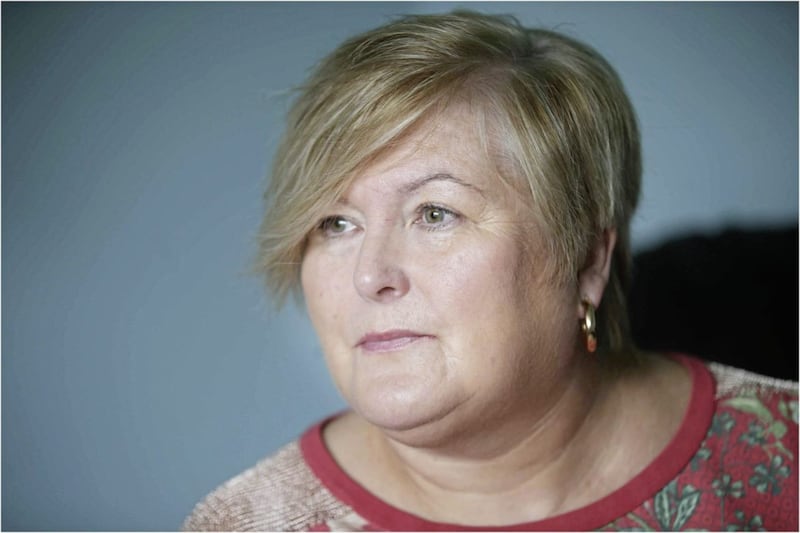
The Co Down woman, who has three other sons with her husband and retired early to be a full-time carer for Aaron, said Muckamore was a "last resort" after two years of "living on my nerves".
She said she remembers the day of his admission vividly and how she'd placed "complete trust" in staff.
Timeline of unprecedented Muckamore abuse investigation
"We finally signed the papers and had to drive Aaron up in the car. He was unaware of what was happening, sitting oblivious and full of smiles. When we arrived there, the nurse came and took him, I had to hand him over.
"I was visibly upset and this is when we got our assurances. They comforted me, but it was just like giving my baby away to people I didn't know and it was killing me inside. They said to me, listen, have a look around and told me 'he will be safe here'.
"When they said that to me, that's what settled me. I trusted them. Was he safe? No."
A year later, Mrs Brown sat in a police station and watched hospital CCTV footage in which her son "showed fear for the first time in his life".
It was her husband who had pursued police to obtain footage from the PICU ward after being initially told by Muckamore that the cameras, although installed, had not been recording at the time.
It has since emerged that more than 300,000 hours of CCTV images exist, capturing alleged physical abuse and mental cruelty of patients over a six-month period in 2017.
At the couple's request last June, police allowed Karen and Glynn Brown to view a tiny fraction of footage relating to their child.
Muckamore Abbey Hospital: 1,500 crimes identified in just one ward
"I've only watched three incidents on CCTV and that was enough. A staff member's face is pixellated and as he's coming over to Aaron, he's holding his hands up in fear," Mrs Brown said.
"I've never seen that in my life. The fear in his wee face. I didn’t know he could raise his hands and show fear.
"In another incident he's sitting on a rocking chair with his Disney book on his knee and rocking away minding his own business. Someone comes over and drives their knuckles into his head. You can see Aaron crouching down, the person knocks the chair over and my child is lying on the floor. That's only one allegation, God knows what else I have to see."
In the months after viewing the footage, the distraught mother said she noticed her mental health deteriorating and began to receive counselling.
"I'm a very outgoing person and have no problems getting on with people. But from June of last year when I saw the CCTV, I couldn't sleep. I started to withdraw from social activities, not wanting to go out. I knew then there’s something wrong with me and went to see my GP. I was prescribed anti-depressants," she said.
"Physically, I am exhausted. There are days when I can hardly put one foot in front of the other and have to lie in bed - which isn’t me."
She said in hindsight she realises there were "warning signs" during early visits to her son when he was being cared for in the intensive care ward.
Aaron remains a patient in the hospital and is well enough to be discharged - he's at home with his family for up to four days each week - but there's no adequate community package for his needs.
"When I look back he was telling us in his own unique way that he wasn’t being treated properly. We thought it was because he missed us. He started attacking me and that was his way of telling us that he wasn’t happy here - and that it was our fault that he was there. I remember that clearly," Mrs Brown said.
"We would have taken him out to the grounds in a wheelchair but he always resisted going back into the ward. We thought he was telling us he wants to come home - but he wasn’t. He was telling us that all was not well.
"Sometimes they didn’t shave him, sometimes he smelt as they said they couldn't get him into the shower. Anyone would tell you, I keep my son immaculate.
"One day in August two years ago I brought new clothes up. He smelt of onions and I stripped him down and asked for a basin.
"There was a yellow bruise on his belly button, where his belt was. I asked - what's that's bruise on his stomach. A few weeks later we get a phone call to say he'd been punched."
"Alarm bells" rang in autumn 2017 when Mrs Brown asked to see a seclusion room where her son been kept for almost three hours - which she compared to a jail.
The use of "unmonitored seclusion" is among suspected offences being examined by a specialist team of PSNI detectives as part of the massive probe.
"It was a small 12x8 bare room with one dirty chair. I saw this on a mid-summer's day but the room was dark, there was no light coming in. They had something over the window, it was painted over or blacked out," she said.
"I asked where the toilet is. One of the few things my son can do in life is take himself off to the toilet. I was told there isn't one. I asked where the drinking water was. There was nothing. I was in shock that in this day and age a room like this exists.
"I smelt a rat after that day but it was my husband who kept burrowing away to get answers."
As pressure mounts for a public inquiry and police interviews are due to take place next month, Mrs Brown said she feels "hopeful" of prosecutions.
She said she is seeking "the truth" from the Belfast health trust, which has been criticised by families over its handling of the crisis.
Trust chiefs have repeatedly apologised for "distress" caused.
"I want to see justice done for my son and others," Mrs Brown said.
"What happened in Muckamore Abbey Hospital is totally unforgivable and involved such heinous acts against the most vulnerable people in society."
